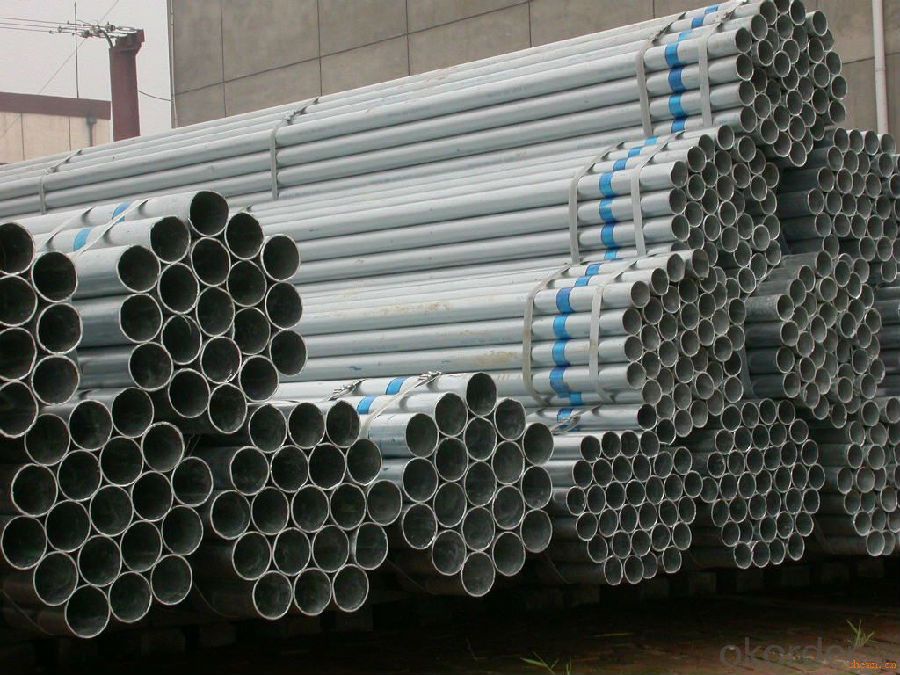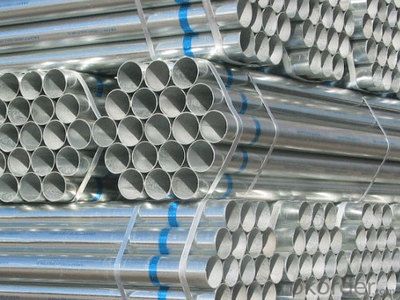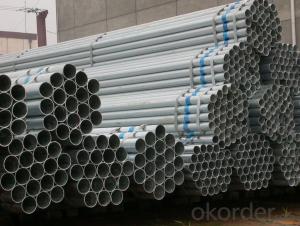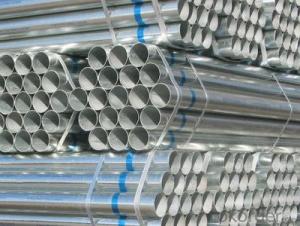Q195-1235 Galvanized Pipe /Steel Tube Greenhouse
- Loading Port:
- Tianjin
- Payment Terms:
- TT OR LC
- Min Order Qty:
- 25 m.t.
- Supply Capability:
- 1000 m.t./month
OKorder Service Pledge
OKorder Financial Service
You Might Also Like
Q195-1235 Galvanized Pipe /Steel Tube Greenhouse
Quick Information
Steel pipe &coupler scaffolding is a traditional scaffolding system that mainly use in decoration of the outside wall.
It's use together with the different angles couplers that use to connect the steel pipes to set up the whole system.
Specification
ommodity | Top supply ms steel price and galvanized steel pipe made in china | |
Size | Diameter | 21.3-610mm |
Thickness | 2.8--10.3mm | |
Length | 1--12m | |
Shape | Round. Square. Rectangular. Or as your requirement. | |
Zinc Coat | More than 200g,as requirement. | |
Raw Materials | Q195.q235.q215.q345 as regiments | |
Min quantity | 5 tons, more quantity price will be lower. | |
Surface Treatment | Galvanized | |
package | in bulk or plastic packaging, as clients demand; | |
Delivery time | 15-20days after receiving your deposit or L/C. | |
Payment | TT or 100% Irrevocable LC at sight | |
Application:
Galvanized steel pipe/tube.
Hot dip galvanized steel pipe/tube.
Seamless steep pipe/tube.
ERW welded steel pipe/tube.
Hot-rolled steel pipe/tube.
Spiral steel pipe/tube.
Carbon steel pipe/tube.
C Z U shape steel/profiles.
Steel coils/galvanized steel coils/sheet/strips
Picture:


- Q:How long do steel pipes typically last?
- Steel pipes typically have a lifespan of 50 to 100 years, depending on various factors such as the quality of the steel, installation conditions, maintenance, and exposure to corrosive elements.
- Q:Is steel pipe made of profiles?
- According to the shape of the cross-section, the steel is generally divided into profiles, plates, pipes and metal products in four categories.Therefore, the steel pipe belongs to the pipe, not the profile.
- Q:Can steel pipes be used for underground culverts?
- Yes, steel pipes can be used for underground culverts. Steel pipes are known for their strength, durability, and resistance to various environmental factors, which makes them suitable for underground applications. They can withstand heavy loads, high water pressure, and the corrosive effects of soil and water. Additionally, steel pipes are available in various sizes and thicknesses, allowing for customization to fit specific project requirements. However, it is important to consider factors such as the soil conditions, water table levels, and potential for corrosion when selecting the appropriate type of steel and protective coatings for the pipes.
- Q:How are steel pipes used in the manufacturing of bridges?
- Steel pipes are commonly used in the manufacturing of bridges for various purposes such as the construction of bridge piers, support columns, and structural elements. These pipes provide strength, durability, and flexibility to withstand heavy loads and harsh environmental conditions. They are often used to create the framework and support systems of the bridge, ensuring stability and longevity. Additionally, steel pipes may be used for the transportation of fluids, such as water or gas, across the bridge.
- Q:Can steel pipes be used for wastewater disposal?
- Indeed, wastewater disposal can be accomplished using steel pipes. Owing to their robustness, strength, and corrosion resistance, steel pipes find widespread application in wastewater systems. They are capable of withstanding the substantial pressure and flow rates commonly encountered in wastewater scenarios, efficiently conveying it to treatment plants or other disposal sites. Moreover, steel pipes can be enhanced with coatings or linings that offer additional safeguard against corrosion or chemical reactions with the wastewater, further enhancing their durability and efficacy in wastewater disposal.
- Q:How are steel pipes used in the construction of stadiums?
- Steel pipes are commonly used in the construction of stadiums for various purposes such as structural support, plumbing, and drainage systems. They provide strength, durability, and flexibility, making them ideal for constructing grandstands, roofs, and other large-scale structures. Additionally, steel pipes are used for installing plumbing systems to supply water for restrooms, concession stands, and irrigation. They also play a crucial role in the drainage system, allowing for efficient removal of rainwater and preventing flooding in the stadium. Overall, steel pipes are essential components in stadium construction due to their versatility and reliability.
- Q:What are the common methods for inspecting the condition of steel pipes?
- Some common methods for inspecting the condition of steel pipes include visual inspection, ultrasonic testing, magnetic particle inspection, dye penetrant inspection, and radiographic testing.
- Q:How do steel pipes handle water hammer?
- Steel pipes handle water hammer by absorbing and dissipating the energy caused by sudden changes in water flow or pressure. The strong and rigid nature of steel pipes allows them to withstand the impact of water hammer without deforming or breaking. Additionally, the smooth interior surface of steel pipes minimizes turbulence and reduces the likelihood of water hammer occurring.
- Q:What are the different methods of pipe cutting for steel pipes?
- There are several methods of pipe cutting for steel pipes, each suited for different situations and requirements. Some of the most common methods include: 1. Manual Pipe Cutters: These handheld tools are commonly used for cutting smaller diameter steel pipes. They typically feature a cutting wheel that is rotated around the pipe, gradually creating a groove until the pipe is cut through. Manual pipe cutters are portable and relatively easy to use, making them suitable for on-site cutting tasks. 2. Hacksaw: Using a hacksaw is a traditional and cost-effective method for cutting steel pipes. This method requires physical effort and time, but it can be effective for cutting pipes with smaller diameters. It is important to use a fine-toothed blade and apply steady pressure to ensure a clean and precise cut. 3. Reciprocating Saw: Also known as a sawzall, a reciprocating saw is a power tool that uses a back-and-forth cutting motion to quickly and efficiently cut through steel pipes. These saws are versatile and can be used with different types of blades to handle different pipe sizes and thicknesses. 4. Band Saw: Band saws are commonly used in industrial settings for cutting large steel pipes. These saws feature a continuous loop of teethed metal blade that runs on wheels, allowing for precise and rapid cutting. Band saws are ideal for cutting large-diameter pipes and can be manually operated or fully automated for high-volume cutting tasks. 5. Pipe Cutting Machines: To achieve accurate and consistent cuts, pipe cutting machines are often used. These machines are designed to cut steel pipes with speed and precision, making them ideal for large-scale industrial applications. Depending on the specific machine and requirements, different cutting methods such as abrasive cutting, flame cutting, or plasma cutting can be employed. It is important to note that the choice of pipe cutting method depends on factors such as pipe diameter, thickness, location, precision requirements, and available resources. Proper safety precautions should always be followed when working with any cutting method to avoid injury or damage to the pipes.
- Q:How are steel pipes used in natural gas processing plants?
- Steel pipes are used in natural gas processing plants to transport and distribute natural gas from one point to another within the facility. These pipes are capable of withstanding high pressure and temperature, ensuring the safe and efficient flow of the gas throughout the plant. Additionally, steel pipes are resistant to corrosion, which is crucial as natural gas can be corrosive. They are also used for connecting various equipment and components in the processing plant, allowing for the smooth operation of the entire system.
1. Manufacturer Overview |
|
|---|---|
| Location | |
| Year Established | |
| Annual Output Value | |
| Main Markets | |
| Company Certifications | |
2. Manufacturer Certificates |
|
|---|---|
| a) Certification Name | |
| Range | |
| Reference | |
| Validity Period | |
3. Manufacturer Capability |
|
|---|---|
| a)Trade Capacity | |
| Nearest Port | |
| Export Percentage | |
| No.of Employees in Trade Department | |
| Language Spoken: | |
| b)Factory Information | |
| Factory Size: | |
| No. of Production Lines | |
| Contract Manufacturing | |
| Product Price Range | |
Send your message to us
Q195-1235 Galvanized Pipe /Steel Tube Greenhouse
- Loading Port:
- Tianjin
- Payment Terms:
- TT OR LC
- Min Order Qty:
- 25 m.t.
- Supply Capability:
- 1000 m.t./month
OKorder Service Pledge
OKorder Financial Service
Similar products
New products
Hot products
Related keywords





























